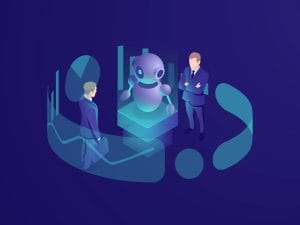AI is no longer just technology of the future—it’s a business necessity today! According to a McKinsey report, over 65 percent of companies have already adopted AI in their operations leading to increased efficiency, reduced operational costs, and more accurate decision-making.
However, many companies struggle to integrate AI effectively, ensuring it delivers real value rather than just a being passing trend. When implemented correctly, AI can automate repetitive tasks, analyze data intelligently for insight-driven decision-making, enhance customer experiences, and optimize operational efficiency. To maximize AI’s benefits for your business, check out the complete integration strategy guide below!
Overcoming AI Integration Challenges
While AI offers numerous benefits, its implementation comes with challenges. Many businesses struggle with AI adoption, both from a technical and strategic perspective. However, with the right approach, these challenges can be effectively managed.
Common AI Adoption Mistakes & How to Avoid Them
One of the biggest mistakes is adopting AI without a clear strategy. Many companies rush into AI implementation without fully understanding their business needs, leading to suboptimal results. To avoid this, businesses should conduct thorough research, set clear objectives, and ensure their infrastructure and data are ready before deployment.
AI Scalability, Cost Management & ROI
AI solutions must scale alongside business growth. A key challenge is ensuring that AI implementations remain efficient and high performing as demand increases. Additionally, the cost of AI adoption is often a major concern. Companies need to balance initial investments with long-term benefits. Regular ROI evaluations are essential to ensure AI delivers real value to the business.
Guide to Choosing the Right AI Solution for Your Business
As mentioned earlier, not all AI technologies fit every business. The right AI solution should align with specific operational needs and challenges. Here are some of the most used AI technologies in business.
Machine Learning & Predictive Analytics
AI can process vast amounts of data and detect patterns that are difficult to identify manually. With predictive analytics, businesses can forecast market trends, assess risks, and make more accurate, data-driven decisions.
Natural Language Processing (NLP) for Automation
NLP enables AI to understand and process human language, making it essential for chatbots and virtual assistants. This technology helps businesses automate customer interactions, enhance service efficiency, and reduce the workload on customer support teams.
Computer Vision & Image Recognition
In industries like manufacturing, retail, and security, computer vision is used to identify objects, detect product defects, and recognize faces. This technology speeds up inspection processes and improves accuracy in visual analysis.
Robotic Process Automation (RPA) for Workflow Efficiency
RPA automates repetitive administrative tasks such as data entry, document processing, and transaction management. By implementing RPA, businesses can minimize human errors, accelerate workflows, and significantly boost operational efficiency.
Simple Steps to Integrate AI into Your Business Applications
Integrating AI into business isn’t just about adopting new technology—it’s about ensuring it functions optimally and adds real value. Here are the key steps to a successful AI implementation.
Identifying the Right Areas for AI Implementation
Not every business process needs AI automation. Identify high-impact areas where AI can deliver the most value, such as customer service, data analytics, or operational efficiency. The goal is to solve existing challenges, not just add AI as a feature without real benefits.
Choosing the Right AI Model & API-Based Integration
Once business needs are clear, the next step is selecting the appropriate AI model. Companies can choose pre-built AI models or develop custom ones tailored to their specific needs. API-based integration is a flexible solution, allowing AI to connect seamlessly with existing systems without requiring a complete infrastructure overhaul.
Testing, Monitoring & Continuous Improvement
AI isn’t a one-time implementation; it requires ongoing testing and monitoring to maintain accuracy. Performance analysis, model refinement, and adjustments based on evolving business trends and user behavior are essential. Continuous optimization ensures AI remains effective and delivers sustained value.
By following these steps, businesses can seamlessly integrate AI into their applications and maximize its impact on operations.
The Future of AI-Powered Business Applications
By 2025, AI is expected to be deeply embedded in business operations—not just for data analysis but also for strategic decision-making and automating more complex processes.
How AI is Transforming Industries in 2025
Sectors like finance, e-commerce, and customer service are among those most impacted by AI. Intelligent chatbots and automation systems are no longer just add-ons—they have become essential for enhancing service efficiency. Solutions like Infobip and Kouventa enable businesses to build AI-driven customer interactions that are more personalized and responsive, helping companies manage and optimize business information with AI-powered approaches.
The Rise of No-Code & Low-Code AI Solutions
One of the most significant emerging trends is the rise of no-code and low-code AI, allowing companies to develop AI-powered applications without requiring advanced programming expertise. Platforms like Gleematic.AI enable businesses to automate workflows without building software from scratch, accelerating AI adoption while reducing implementation costs.
With these rapid advancements, AI is becoming more accessible to businesses of all sizes. It’s no longer just for large enterprises; small and medium businesses can now leverage AI to boost productivity and stay competitive.
Also Read: What is Generative AI: Unlocking Future of Business Transformation
Get Started Now! Find the Right AI Partner for Your Business
AI integration isn’t just a trend—it’s a strategic move to enhance efficiency, competitiveness, and innovation. However, successful AI adoption requires careful planning, from selecting the right technology to ensuring infrastructure and workforce readiness.
CTI Group and our subsidiaries provide technology solutions to help businesses seamlessly adopt AI. From cloud-based AI implementation to business process automation, we offer secure, flexible solutions tailored to your company’s needs. Contact us here to explore the best AI solutions for your business applications!
Penulis: Wilsa Azmalia Putri – Content Writer CTI Group


